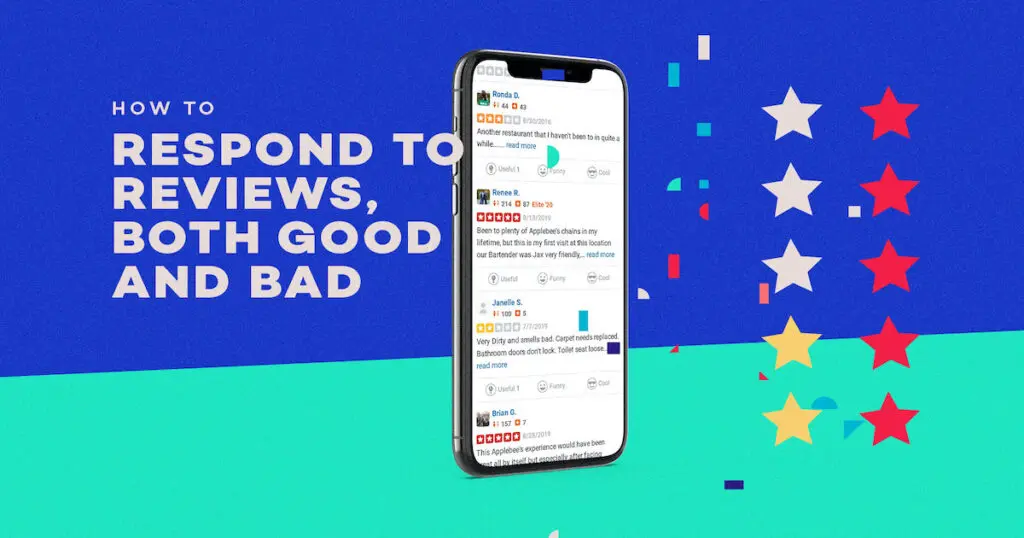It’s amazing how fast a customer can go from working with you to leaving a highly visible review about their experience with your company. Five-star reviews are exciting and one-star reviews are frustrating. Actually, frustrating isn’t even the right term – for small business owners a one-star review can be downright depressing. You know the person who left the review, you went out of your way to help them, they were impossible to please and have now left a completely inaccurate review for all to see.
This article is a guide on how to respond to online reviews from customers, both good and bad. Those first few moments after you read a review, emotions are high and the last thing you’re thinking about is how to turn that review into a strategic marketing advantage.
Think About These Things Before Responding To A Review
In the days prior to the internet, social media more specifically, customer reviews used to take days, if not weeks, to make their way back to a business. Business owners and managers could take their time responding because the entire interaction was between a single customer and the company.
Today, a customer can leave a highly visible negative review within minutes of interacting with a business. You must be quick to reply or risk allowing the public perception of your company to be dictated by an unhappy customer – regardless of whether their review is complete, truthful, or coherent.
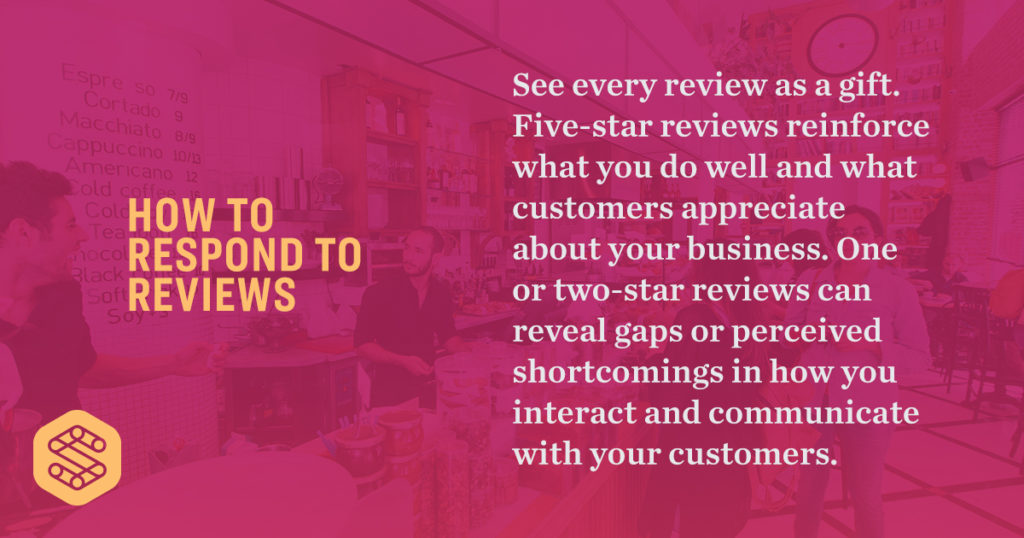

The combination of high visibility, the sense of freedom a customer feels when writing their review, the speed with which their comments can be seen by others, and the personal investment business owners have in their companies creates an environment where emotions can run high, compromising long-term judgement.
By setting emotion aside and taking time to create a more measured, thoughtful response, the action you do take will be better for your company and your client relationships. As cut and dry as replying to a review may seem to be, there is actually a lot you, the modern business owner, needs to consider.
First, and above all, you must see every review as a gift. Five-star reviews reinforce what you do well and what customers appreciate about your business. Those one or two-star reviews can reveal gaps or perceived shortcomings in how you interact and communicate with your customers.
Regardless of the rating, the insight you gain from reading a customer’s written review is priceless. They are literally telling you what you do well and what you can work on. As easy as it might be to read the review and move on, slowing down to understand what the customer is really trying to communicate will help you gain a pulse on the customers you attract and the customers who aren’t the best fit for your business. All of this guides you towards improved interactions with your customers.
It can be tough to appreciate one-star reviews; however, there is treasure buried in them and it’s up to you to see the worth.
Once you mentally commit to seeing every review as a gift, the next thing you want to know is “what’s the best process for handling each reply?”
- Should you read reviews all day, everyday like email?
- Do all the review platforms matter?
- Are business owners supposed to reply to every review?
- How should I actually reply to a negative review?
- Is the owner the best person to respond?
- Does the company have someone on staff who is best suited to handle replies?
While it seems like a lot to consider, attention to questions like those above is essential to turning your review profiles into business assets. Think about it, you could approach review management like you have in the past, like every other business owner out there. If you believe that ignoring customer reviews doesn’t hurt and you don’t see the value in engaging with customer feedback, honestly, you have no reason to change what you’re doing.
However, you do care. You do see the value in customer communication. You’re reading this article because you actually want to be noticeably better online than your competitors.
So here is the secret about reputation management through review platforms: the value is not in the practice of responding to reviews, the value is in how and what you communicate through your responses. What we are actually going to do is create a new marketing strategy built around your review responses. That’s how we’re going to put those reviews to good use and have a positive impact on your business.
The Review Sites You Need To Actively Monitor
When talking about how to respond to online reviews, you have to create a list of what review sites you need to be monitoring. We’ll talk about the big ones in a few moments. First, we need to make sure that we cover any outlying review sites that you haven’t thought of.
Nearly every industry has one or several industry specific review sites. For instance, wedding planners actively monitor a site called WeddingWire for reviews. Brides and couples will bypass many other review sites and head straight to WeddingWire for industry specific reviews about vendors, planners and venues – all necessities for the perfect wedding.
Before you spend any time responding to reviews, know the platforms which are most important to your industry.
How can you find these platforms? Here are a few suggestions.
- Ask industry colleagues if there are any directory listing websites or review websites they use regularly.
- Search google for “[Your Industry Term] review sites” – for instance, wedding review sites will show the aforementioned WeddingWire at the top of the search results.
- Perform a search for another company in your industry who is seen as an industry leader – a search such as “[Your Competitor Name] reviews” will give you a first page full of sites that may provide opportunity for you to become active on.
Once you determine which industry specific review sites are relevant to your review marketing strategy, you can turn your attention to the most prominent customer review sites.
The way you handle your responses on these industry specific sites will be similar, if not identical to the way you handle your responses on the ‘big boy’ sites.
Google and Yelp are the two major review sites that 99% of business owners need to keep in front of them at all times. A distant third would be Facebook, as Google integrates it’s ratings and reviews directly into a company’s Google profile and Yelp is the leading website focused solely upon ratings and reviews.
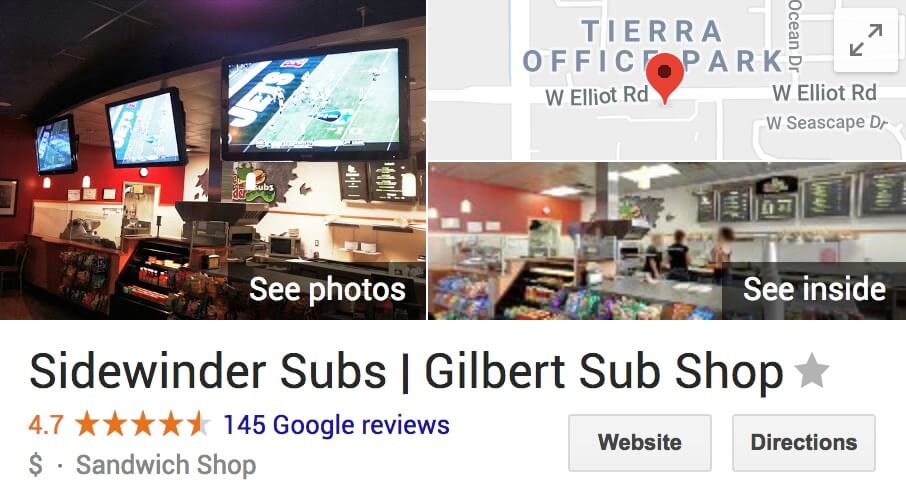

Understanding How Google Reviews And Responses Impact Your Business
There continue to be studies demonstrating that Google ratings actually factor into a business’s search ranking. Why would a business’s rating have an impact on search ranking? Consider the following example.
Say you do a search for the “best locally owned restaurant” in your city. A company wanting to rank higher in a Google search for that term creates a page called “The Best Locally Owned Restaurant in Your City.” It is safe to assume that “THE BEST” restaurant will have a rating that validates that claim. However, this restaurant has a Google review rating of 1.7 stars. Google is smart enough to know that despite this company’s finest efforts to portray themselves as “the best restaurant,” they are not the best as made clear by their rating. Evidence shows this restaurant would have a difficult time ranking as a top search result because their statement doesn’t match reality.
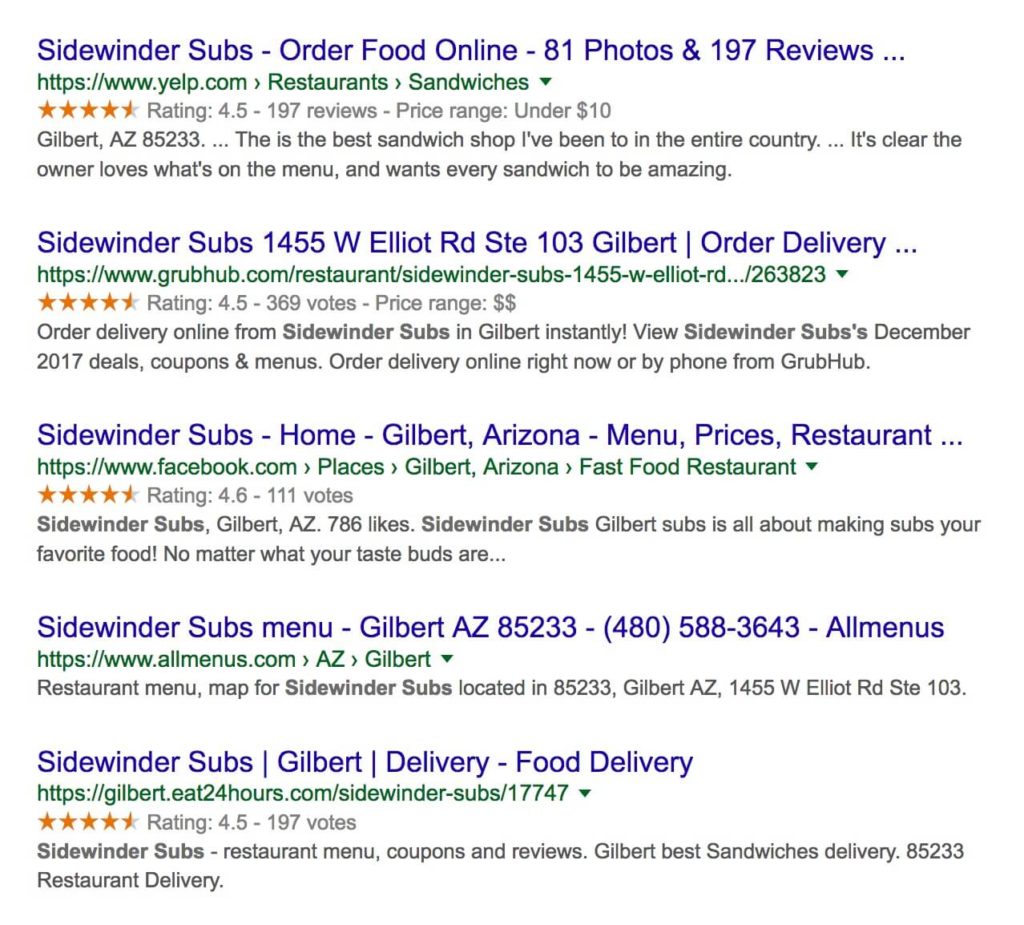

In addition to a business’s review star rating, Google also considers how active the review page is – both in the number of reviews received and the level of engagement from the business owner. Lots of activity on your Google review page tells Google that you are committed to connecting with your customers. It tells Google that you want to communicate with those who are communicating with you.
Google isn’t interested in playing favorites – it is interested in showing THE BEST results. You make your business listing more attractive by engaging with every review.
Understanding How Yelp Reviews and Responses Impact Your Business
Yelp is a bit different than Google or other review sites – they won’t actually show every review that is submitted – yes, they will actually hide reviews from your page. This is one of the biggest frustrations business owners have with Yelp. You work hard to provide a new customer a great experience and they decide to hop on Yelp and leave a five-star review – yet it never shows on your Yelp page (they are cascaded to a section called ‘not recommended’ that very few people even know exists).
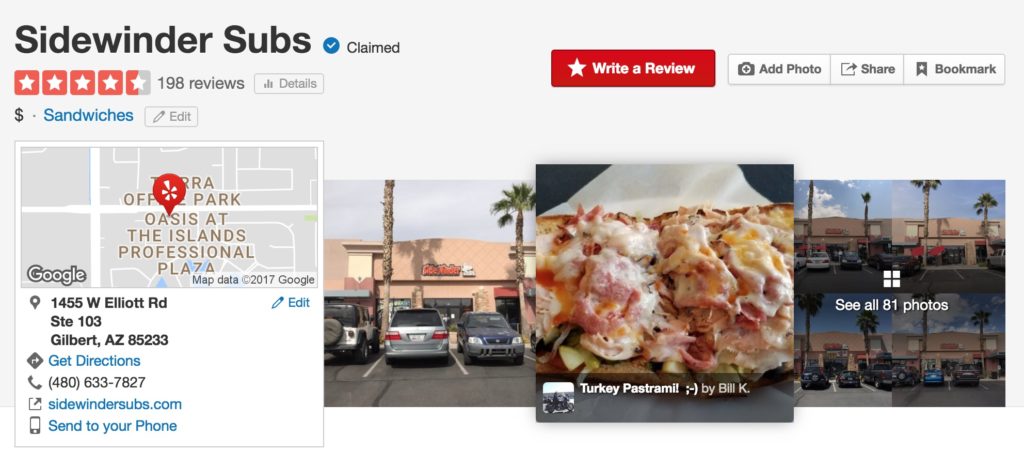

The reason for the frustration of disappearing reviews comes from Yelp’s proprietary algorithm used to determine which reviews to show. Over the years, Yelp’s algorithm has become controversial and has even impacted their revenue negatively. In our experience at Shrein Media, we have seen businesses receive dozens of positive reviews in a short period of time and only one or two actually show up on Yelp’s site. Why? Yelp will determine which reviews are valuable and cascade those which it deems irrelevant.
So what factors are taken into consideration by Yelp’s proprietary algorithm? While it’s not known – Yelp keeps all of this a secret, much to the dismay of many business owners – Yelp does say that someone who is not active on their network may not have their review recommended. A customer who leaves a five-star rating as their first Yelp review may not see their review ever make it to the page. If Yelp arbitrarily determines that the user may have been prompted to sign up for an account to leave a five star review or if they are a party with a conflict of interest, it may not ever show that particular review.
Unfortunately, there is nothing you can do, as a business owner, to get these cascaded reviews to show up. It is Yelp’s platform and they make the rules.


Click here to watch a video of Yelp’s explanation for this practice
Why Business Owners Should Not Count On Yelp Reviews, Google Reviews Or Any Other Outside Review Site For Business Success
“With review sites like Google and Yelp and social media platforms like Facebook, do I even need a website anymore?”
This is a common question, and while this post is not about business websites, it is worth mentioning that relying too heavily on Google reviews through Google My Business or Yelp reviews could put your business in a very precarious position.
You do not own your page on Google, Yelp, Facebook or any other network. If you ever find yourself saying, “We basically built our business through Yelp reviews,” you need to consider what happens if Yelp suddenly suspends your account. You are immediately up a creek without a paddle.
You are not in control of any platform you do not own and your account can be suspended or deleted at any point in time for any reason, whether it’s a legitimate reason in your eyes or whether it’s no reason at all. This underscores the importance of having platforms that you own.
“That’s not going to happen to me.” It’s true – you probably won’t have any issues, but you will never be able to say that for sure. As a matter of fact, as this post is being written, a Shrein Media client had their Google My Business page suspended without any warning from Google. When a suspension happens, there is an appeal process – however, companies will often offer very little communication regarding your case and you may never get an answer about why your page was suspended.


This really goes back to what we covered previously above – you need to know which review platforms are most relevant to your business so as to diversify how you communicate with your clients or customers. If one site is suspended or removed, you’ll have other channels to communicate with.
Before we move on, it is important to note that the only platform you are 100% in control of is your website. The only list of contacts or ‘fans’ you own outright is your email list. While actively managing your review site pages, engaging with customer reviews should be a standard practice, those sites will never be a replacement for having a strong website presence. Nor will a list of ‘followers’ be a secure alternative to an email list of clients who you can communicate with when you need to.
Who You Are Really Talking To When Responding To Reviews
Contrary to common thought, your response to a review is not written for the sole benefit of the reviewer. In most situations, you are really responding to two people: the person who left the review and future customers who will read that review and your response. The words you use in your response depends on the nature of the review – whether the review is cordial, well spoken and written with a kind heart or it’s belligerent and displays a rant-like quality.
Well-meaning people will leave reviews of all star numbers. Regardless of how many stars they leave, their comments will often contain coherent examples, some form of positive thought and specific suggestions or advice for what they appreciate in businesses similar to yours. Even though a one-star rating can sting, when it’s left by a well-meaning reviewer you have a great opportunity to communicate with that customer, to better understand them and then respond. You’re writing to show them and the rest of the world that you want to engage with your customers even when it isn’t easy for you.
Another group of people are tougher to tolerate, and even harder to appreciate. These people post comments with traits such as all caps, lots of exclamation points, incoherent stories and no feedback about what they hoped to experience. It doesn’t matter what you do or what you say, you will not be able to win this customer over. Business owners have often bent over backwards to accommodate this type of customer. Despite being offered generous solutions, these customers cannot be made happy – and they will tell the world how unhappy they are. When you get reviews that are basically “I hate humanity” reviews, your response is no longer written for the reviewer, it is written for everyone else who will be reading the review.
Before we move on, it is important to note that the “I hate humanity” reviews are still hard to stomach because you don’t want your customers to base what they believe about you from an anomaly. The good news is, most people will be able to spot a review where the customer had unreasonable expectations. At that point, the reader is interested in how you respond to that type of review.
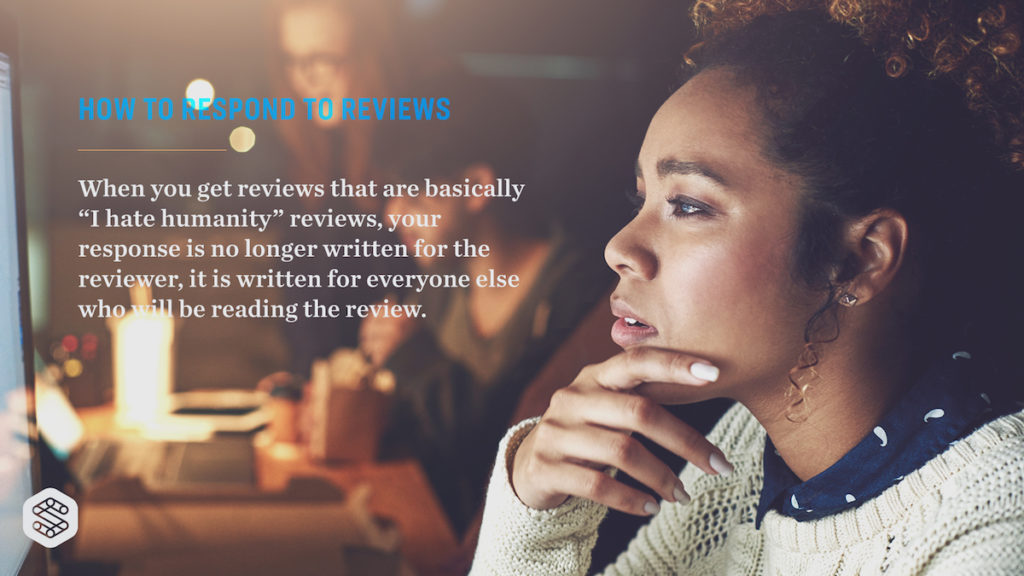

When a reader comes across a colorful comment, including four-letter words, most of them will read and think, “Wow, something weird is going on there.” Your response is either going to confirm that the customer was justified in their comments or it will completely neutralize the impact of that person’s comment. Obviously the latter is what we want.
How to Choose The Best Person to Be In Charge Of Responding To Reviews
The business owner is obviously the most natural choice for responding to reviews, especially in small companies. As much as it may feel like the owner who should be the one responding, it doesn’t have to be the owner, CEO or COO.
The ideal person to place in charge of responding to reviews is someone who embodies the following traits:
- Someone who understands the big picture of your business
- Someone who knows what touch points a customer will encounter when working with your business
- Someone who loves the business, enjoys working for the company and wants to see the business succeed
- Someone with empathy who can place themselves in other people’s shoes and sense the emotions that person felt when writing their review.
There are three places you can find the type of person described above.
- The first place to look is within your marketing or customer service department for the best person. The traits of individuals who choose to work in these departments are often the traits you want in the person who responds to your reviews.
- The second place is to bypass traditional ‘department’ responsibilities and seek out the person best suited for the job. Great candidates are often overlooked because they are in departments completely unrelated to digital marketing or customer service. However, they possess the skills necessary to succeed.
- The final place to look for the right person to respond to reviews is outside the walls for your company. You might consider a family member or friend who fits the listed profile or think about hiring a digital marketing company like Shrein Media who can manage this part of the process for you.
How To Respond To A Negative Online Review
You have committed to seeing every review as a gift. You are aware that you are actually responding to more people than just the individual reviewer. You have selected the right person to leave the response. Now it’s time to actually respond to your most recent negative review.
The best way to respond to a negative review is with a healthy dose of empathy and accurate information. While you are constantly thinking about your business – you wake up in the morning thinking about what you have to do that day and go to bed thinking about what you have to do the next day – your customers have a lot more going on in their lives than their interaction with your business. When a customer leaves a negative review, you can often see where their experience with your business gets caught up in other frustrations in their life.
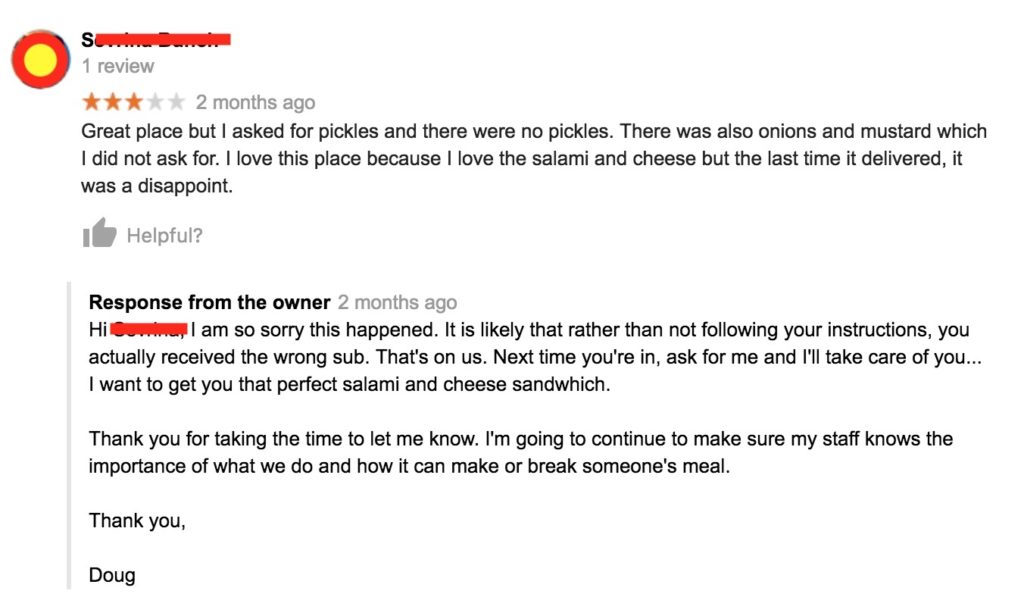

Our customers have a lot going on and so much of their life is out of their control. Their finances are stretched, their relationships are strained and the straw that breaks the camel’s back is their sandwich that has mayo on it when they explicitly said no mayo. On top of that, the bread tasted funny.
So how do you respond to these negative reviews that seem to use your business as a punching bag?
Here is one example of how you would respond if you were a doctor with a negative review about long wait times during an office visit.
First, think about how you would feel if you were waiting to be seen during your lunch hour. You showed up on time but the doctor’s office was behind schedule. Next, think about how you would feel about having to decide if you should skip the doctor’s appointment in order to get back to work on time, or stay and lose pay because you’ll be late back from lunch.
How would you feel? Frustrated? Maybe devalued?
Start your review like this:
“Hi Dave,
Thank you so much for letting us know about this. Your time is really important and I’m sure there were things on your schedule that you were concerned about being able to get back to on time.”
You are not a corporation trying to smooth over a situation, you’re a caring person who is seeking to understand another person’s situation. Continuing on:
“After I read your review, I immediately followed up with our staff. Unfortunately, the reason we were behind schedule on the day of your visit is because we had a patient taken by ambulance to the hospital and it slowed us down earlier in the day.
I realize this didn’t help your wait time, but I wanted to let you know why we were behind. We really do value your time and the next time you visit with us, please be sure to tell our staff that you’re on a tight schedule. We’ll do our best to get you in and out as quickly as possible.”
Instead of trying to walk-back the issue, you are communicating that you understand and empathize with their situation, while letting the patient know you would like to be treated the same way. Use information along with empathy; that gives you the ability to neutralize the situation.
Should You Respond To Positive Reviews? And If Yes, How?
It’s a no brainer to reply to negative reviews, but what about positive reviews? Is there really anything to say? Isn’t it best to just let the customer’s comments stand on their own?
If a customer made a point to come back to your business, ask to speak with you, then tell you about their amazing experience, wouldn’t they expect some sort of response? Of course. You wouldn’t just stand there, shaking their hand. You would acknowledge their comments, share a bit of your perspective and show your appreciation.
When a customer leaves a positive review you have the opportunity to communicate with them at the height of their excitement for your business. You can affirm their experience by repeating their comments back to them with gratitude and appreciation.
A customer will leave a comment along the lines of:
“I found the front office staff to be helpful and friendly. The doctor listened to my issues and provided several options for my consideration. My experience was excellent. I will definitely recommend this doctor’s office to my friends.”
Your reply to this comment should look something like this:
“Thank you for the kind words and specific feedback. We’re so glad to hear you enjoyed your visit with the doctor. An excellent experience is obviously what we set as our goal for every patient and it’s so exciting to hear when we’ve done that.
You have our word that we will make sure any friends you recommend to our office will receive the same helpful, friendly, excellent experience you had.
Thank you, again!”
The customer used the worlds helpful, friendly, excellent, experience, recommend and friends. The response included all these words. This type of reply demonstrates that the customer was seen, heard, acknowledged and valued – adding to their overall experience with the company.
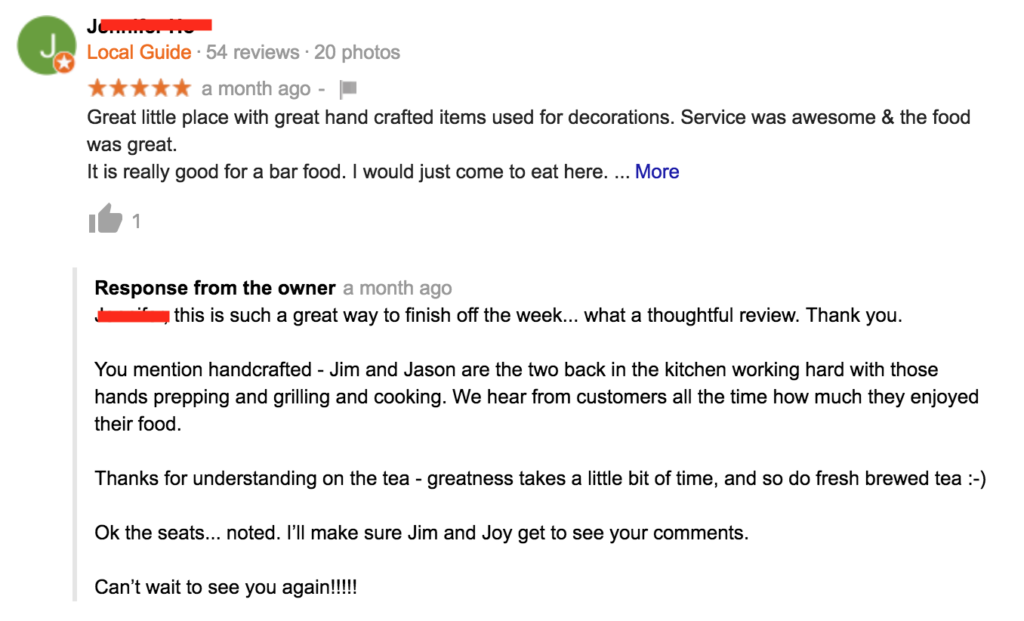

Is An Apology Always Necessary?
So the next question is, “Should I apologize in my response?” The answer is yes and no.
Most of the time, despite your best efforts and regardless of circumstances, an apology is necessary. As tough as it may be, customers really just want to have a wrongdoing acknowledged so they can move on.
There are, however, certain circumstances where an apology is not necessary. The customer may go into great detail about how they were wronged, share all sorts of details about their experience – yet, the best thing for your business is to just move on.
So how do you know the difference? It requires being able to see the big picture and look beyond the isolated incident. A great example of when an apology isn’t necessary is when the integrity or intelligence of an employee is called into question by the customer.
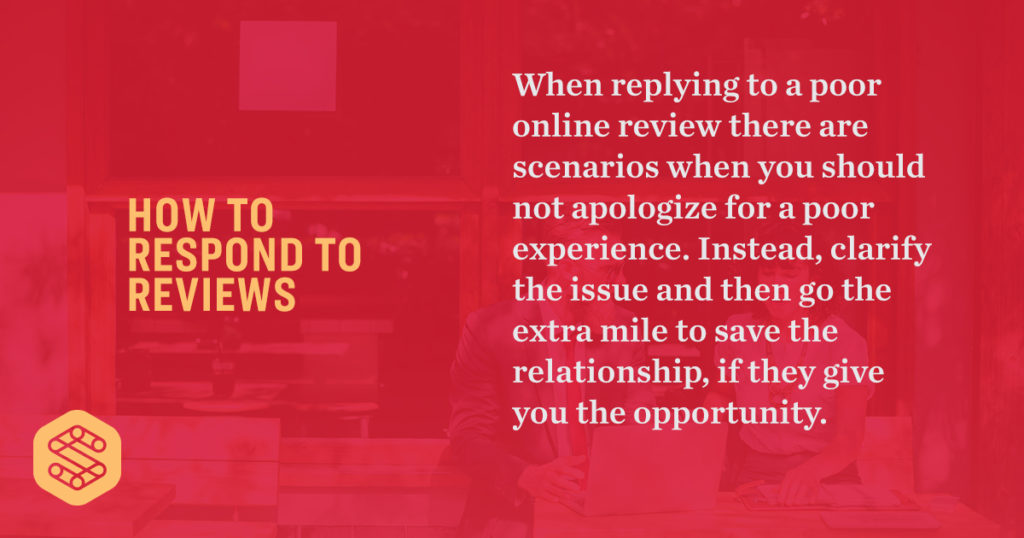

As a business owner, you create policies and procedures that your staff will implement. It is inevitable that an employee will come face to face with a customer who doesn’t like the policy. For instance, if an employee at a restaurant knows not to honor an expired coupon, then the customer leaves a review saying,”they wouldn’t even take my coupon, even though other sandwich shops would do it,” you have nothing to apologize for because your staff did exactly what they were supposed to do.
In this scenario, you could respond by stating something along the lines of the following:
“Hi Dave,
Thank you for taking the time to let us know about your visit. I appreciate that you came in, and that you thought so much of us to give us a try. In regards to not being able to use an expired coupon, as the owner I made the decision not to take expired coupons and my staff was following my instructions. I am very proud of the work they do and the effort they put into making our restaurant a fun and welcoming place.
While I know it’s frustrating to have a coupon and not be able to use it, this is the way we’ve chosen to run our business so we can remain profitable. All this to say, I would like to invite you to come in again and introduce yourself to me. It would be great to meet you and have an opportunity to show you that we really do care about you.”
This is an opportunity where you don’t apologize, you clarify, then you go the extra mile to save the relationship, if they give you the opportunity.
Which Old Reviews You Should Respond To
Many businesses will go months, maybe years, not responding or replying to reviews. If that’s you, just know that it’s never too late to start. While you will want to reply to every review going forward, don’t go back in time and start replying to reviews that are three years old. At Shrein Media, when we begin replying to reviews on behalf of a new client, at most we will reply to the previous three weeks of reviews.
A great way to start off a reply to a review that is several weeks old is along the lines of, “Hey Barb, I just realized that I hadn’t replied to your review, and wanted to let you know that I appreciate it. I’m forwarding it onto the rest of our team. Thanks so much.” Then move forward from there, checking reviews at the beginning of every week and again at the end of each week.
Crafting Your Replies – Length, Spelling, Grammar, Best Practices
As you begin to respond to new reviews that come in, use as many words as necessary and not one word more, always paying attention to spelling and grammar. Why? You never know when you’re going to be replying to an English teacher. Teacher or not, you’re being graded on your reviews and your responses to those reviews – in addition to your products and services. If you’re not a great writer, and spelling and grammar isn’t your thing, that’s okay. Write out what you want to say, don’t overthink it, give it your best shot. Make sure to have somebody who is better at punctuation and grammar re-write your responses. Even if there is a mistake in the end, it’s not the end of the world.
It’s tempting to write out your replies directly in Google, Yelp, Facebook, etc., but it is in your best interest to use a separate document editor like Word or Google Docs. This neutral site gives you a place and time to calm down, write, rewrite and then get a second opinion on your reply before you post.
A second set of eyes taking the time to help you process your comments and review your reply is always a good idea. All businesses benefit from at least one other person reading a response before it goes live – especially if it is in response to a negative review.
You’ll notice that some customers won’t leave any comments in their review, they’ll simply leave a rating. A fun way to show your company’s personality and to be active with these reviews is using emojis. If someone leaves a 5-star review, you can reply with five emojis. If they leave a 4-star review, reply with four emojis. This keeps things fun, light and allows you to engage with all replies.
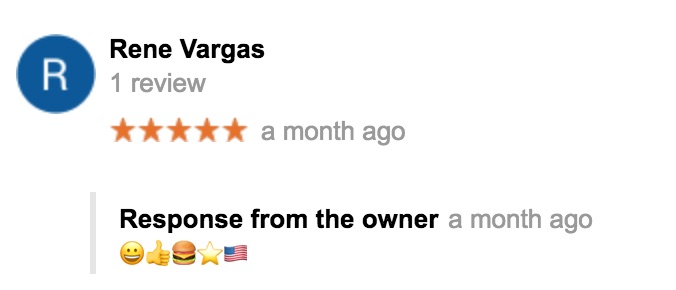

Final Thoughts Before You Get To Work On Your Review Marketing Strategy
Even with all the information, examples and instructions in the world, the only way to get good at responding to reviews is to actually do it. Making mistakes in your reviews will be unavoidable. You can do everything right and a customer will take a word or a phrase the wrong way. The wound will open up again and the frustration becomes new.
Learn from your mistakes and move forward. If you use a phrase that gets misinterpreted, find an alternate phrase to use the next time a similar comment comes in. If you promise follow-up in your reply and don’t follow-up, create a plan that will prevent you from forgetting the next time around.
At Shrein Media, we reply to dozens of comments every month on behalf of our clients. We want to respond to every review that comes in. As much as it is our plan to reply, there are times when something prevents us from responding and rather than sweating it out, we just move on and make sure we get the next review.
When all is said and done, reviews are nothing more than a customer asking to speak to a manager and the response is nothing more than communicating honestly with a customer. Sometimes you can make that customer happy and sometimes you won’t be able to. Always err on the side of diligent effort – other customers will see what you’re doing and it will go a long way in winning over their business.
